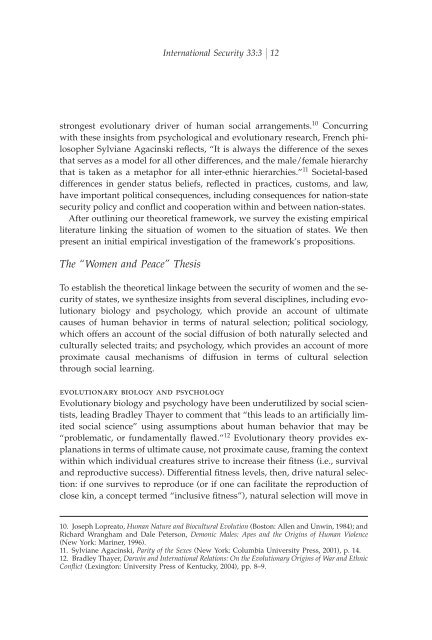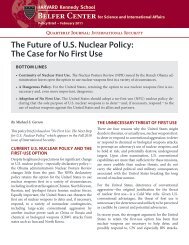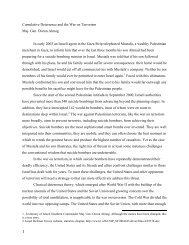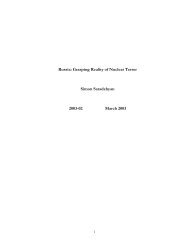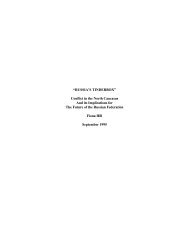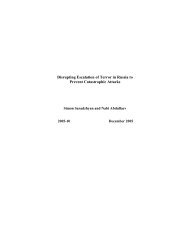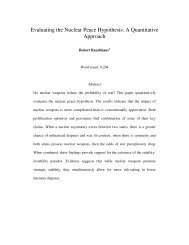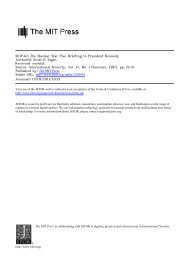The Heart of the Matter Valerie M. Hudson, - MIT Press Journals
The Heart of the Matter Valerie M. Hudson, - MIT Press Journals
The Heart of the Matter Valerie M. Hudson, - MIT Press Journals
You also want an ePaper? Increase the reach of your titles
YUMPU automatically turns print PDFs into web optimized ePapers that Google loves.
strongest evolutionary driver <strong>of</strong> human social arrangements. 10 Concurring<br />
with <strong>the</strong>se insights from psychological and evolutionary research, French philosopher<br />
Sylviane Agacinski reºects, “It is always <strong>the</strong> difference <strong>of</strong> <strong>the</strong> sexes<br />
that serves as a model for all o<strong>the</strong>r differences, and <strong>the</strong> male/female hierarchy<br />
that is taken as a metaphor for all inter-ethnic hierarchies.” 11 Societal-based<br />
differences in gender status beliefs, reºected in practices, customs, and law,<br />
have important political consequences, including consequences for nation-state<br />
security policy and conºict and cooperation within and between nation-states.<br />
After outlining our <strong>the</strong>oretical framework, we survey <strong>the</strong> existing empirical<br />
literature linking <strong>the</strong> situation <strong>of</strong> women to <strong>the</strong> situation <strong>of</strong> states. We <strong>the</strong>n<br />
present an initial empirical investigation <strong>of</strong> <strong>the</strong> framework’s propositions.<br />
<strong>The</strong> “Women and Peace” <strong>The</strong>sis<br />
International Security 33:3 12<br />
To establish <strong>the</strong> <strong>the</strong>oretical linkage between <strong>the</strong> security <strong>of</strong> women and <strong>the</strong> security<br />
<strong>of</strong> states, we syn<strong>the</strong>size insights from several disciplines, including evolutionary<br />
biology and psychology, which provide an account <strong>of</strong> ultimate<br />
causes <strong>of</strong> human behavior in terms <strong>of</strong> natural selection; political sociology,<br />
which <strong>of</strong>fers an account <strong>of</strong> <strong>the</strong> social diffusion <strong>of</strong> both naturally selected and<br />
culturally selected traits; and psychology, which provides an account <strong>of</strong> more<br />
proximate causal mechanisms <strong>of</strong> diffusion in terms <strong>of</strong> cultural selection<br />
through social learning.<br />
evolutionary biology and psychology<br />
Evolutionary biology and psychology have been underutilized by social scientists,<br />
leading Bradley Thayer to comment that “this leads to an artiªcially limited<br />
social science” using assumptions about human behavior that may be<br />
“problematic, or fundamentally ºawed.” 12 Evolutionary <strong>the</strong>ory provides explanations<br />
in terms <strong>of</strong> ultimate cause, not proximate cause, framing <strong>the</strong> context<br />
within which individual creatures strive to increase <strong>the</strong>ir ªtness (i.e., survival<br />
and reproductive success). Differential ªtness levels, <strong>the</strong>n, drive natural selection:<br />
if one survives to reproduce (or if one can facilitate <strong>the</strong> reproduction <strong>of</strong><br />
close kin, a concept termed “inclusive ªtness”), natural selection will move in<br />
10. Joseph Lopreato, Human Nature and Biocultural Evolution (Boston: Allen and Unwin, 1984); and<br />
Richard Wrangham and Dale Peterson, Demonic Males: Apes and <strong>the</strong> Origins <strong>of</strong> Human Violence<br />
(New York: Mariner, 1996).<br />
11. Sylviane Agacinski, Parity <strong>of</strong> <strong>the</strong> Sexes (New York: Columbia University <strong>Press</strong>, 2001), p. 14.<br />
12. Bradley Thayer, Darwin and International Relations: On <strong>the</strong> Evolutionary Origins <strong>of</strong> War and Ethnic<br />
Conºict (Lexington: University <strong>Press</strong> <strong>of</strong> Kentucky, 2004), pp. 8–9.


